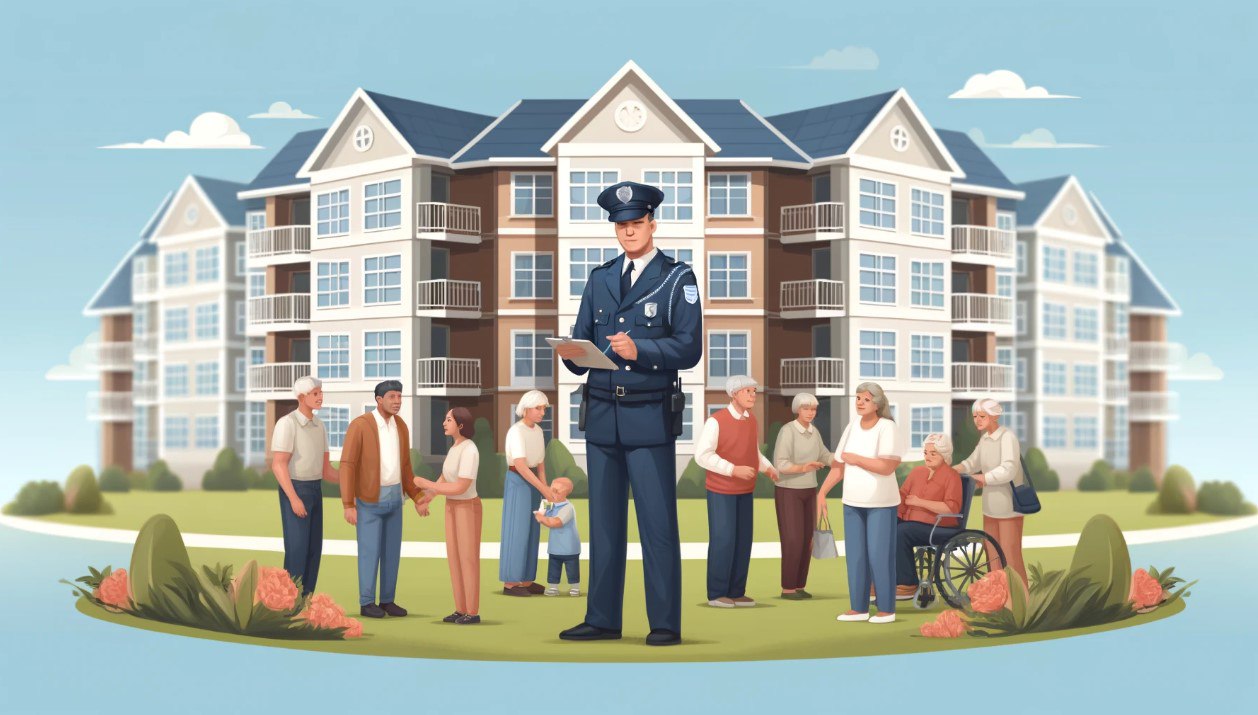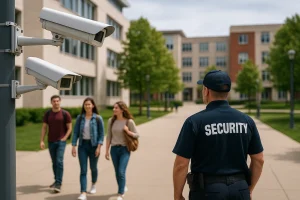The Essential Role Of Courtesy Officers In Apartment Communities: Duties, Qualifications And Impact
Understanding The Role And Duties Of Courtesy Officers In Apartment Communities To understand the role and duties of courtesy officers in apartment communities, you must first understand why courtesy officers have become so important. Courtesy Officers have such an increasingly essential role in ensuring security in apartment communities because almost 39 million people in the […]
By Catherine Shannon
April 10, 2024

Understanding The Role And Duties Of Courtesy Officers In Apartment Communities
To understand the role and duties of courtesy officers in apartment communities, you must first understand why courtesy officers have become so important. Courtesy Officers have such an increasingly essential role in ensuring security in apartment communities because almost 39 million people in the US now live in apartments. High housing prices, flexibility to relocate, and less maintenance responsibilities make renting attractive. And since a secure apartment property is very attractive to renters, those locations can command higher rental rates.
Potential renters with a high priority on safety for themselves and their families often specifically seek out courtesy officer apartments. What is a courtesy officer apartment? It is an apartment community with courtesy officers employed there- to safeguard residents, property, and assets. Courtesy officers have become greatly desired by property management companies- so they can offer a well-protected community for premium rental.
Exactly what is a courtesy officer?
A courtesy officer is a security professional that is usually directly employed by property management– as an internal employee and a member of the management staff.
Property management companies employ courtesy officers to act as a bridge between residents and property management- to add that desired layer of security to an apartment complex
Is a courtesy officer a police officer?
Courtesy officers are often former or off-duty law enforcement professionals, already well-trained in security protocols. Property management will frequently provide them with on-site housing- free or at reduced rent– as part of their compensation. Employing a former/current police officer as a courtesy officer can save management companies money- it is often cheaper than hiring traditional security guards from an outside company. Additionally the obvious presence of a residing current police officer in the complex is a visible crime deterrent- with an added bonus if they are allowed to take their squad car home after work and park it in the community.
What Does A Courtesy Officer For Apartments Do?
Many want to know what do courtesy officers do? Courtesy officer responsibilities are diverse. Here is a more in-depth look at those responsibilities. Courtesy officers:
- Provide a Visible Security Presence– They conduct patrols in the apartment complex looking for any suspicious activities, and respond to disturbances. Also they proactively prevent problems such as car burglaries, home invasions, robberies, etc.
- Enforce Management Protocols– Officers enforce community rules about parking policies, noise ordinances, non-resident pool use, trespassers, etc.
- Maintain Property Standards– They check on the status of community property (e.g. door locks, broken lights, fences, sprinkler systems, property damage, etc.) and also monitor CCTV.
- Offer Customer Service– Courtesy officers serve as management representatives for residents needing assistance or having concerns, and relay commentaries to management.
- Resolve Conflict– C/Os mediate conflicts among residents, de-escalating tense situations.
- Respond to Emergencies– They deliver quick responses to fires, medical incidents, or natural disasters, contacting authorities/maintaining order until backup arrives.
- Attend Meetings– It is often mandatory for courtesy officers to attend resident and/or management meetings.
- Report Serious Incidents– They advise management of any serious incidents or if law/emergency services were contacted.
What is a courtesy patrol?
Courtesy officers are sometimes mentioned as performing something called a “courtesy patrol.” Courtesy patrols are regular walkthroughs around the apartment complex by courtesy officers- checking on the premises (pools, laundry rooms, or clubhouses). But the phrase “courtesy patrol” has also been used by traditional security guard services about their standard patrol and guard services. “Courtesy patrol” is also used by various Departments of Transportation- to refer to freeway service patrol done to reduce traffic congestion/provide incident management and motorist assistance at trouble spots. So now the term courtesy patrol has expanded.
Comparing Courtesy Officers And Security Guards
Despite the different titles, the basic role of courtesy officers and security guards is essentially the same. But there are some key factors to compare for each of these security roles.
Courtesy Officer Roles- Pros and Cons
- A C/O is an employee of the property management company, residing on-site.They have more opportunities for community-building and personal relationships with residents on a daily basis.
- However, courtesy officers live in the community they serve, tasked with enforcing rules where he/she lives with their family. They may face backlash from other residents (e.g. car getting vandalized or family being confronted by angry neighbors). This could make courtesy officers back down on rule enforcement.
- If they are currently police employees, a C/O only works when off-duty from that job- and may not provide enough of a presence in the complex as a result- leaving gaps in security coverage.
- C/Os working multiple jobs can suffer burnout.
- A courtesy officer is not covered by property management’s liability insurance in case of litigation related to services rendered, but is covered by workers comp. Also a courtesy officer usually has workers comp coverage for “off duty employment” from their law enforcement agency insurance.
- They enforce property rules/regulations- can issue fines or citations.
- Courtesy officers can distribute flyers and notices for the property management company. Also since some property management companies have chosen to incorporate mass notification technology into their security, this gives courtesy officers the ability to communicate quickly with residents in real time about events or emergencies.
- There are no industry standards or training requirements for an apartment courtesy office, though those with the law enforcement background have met those protocols.
Security Guard Roles- Pros and Cons
- Security guards are hired from security companies and present a more formal uniformed brand.
- Their interactions with residents are more transactional and less personal.
- Property management companies may want a more unobtrusive security brand and have greater choices with diverse security guard companies. For instance, can women be security guards in some communities to achieve that less-threatening security presence?
- They may be more expensive to hire than courtesy officers.
- A security guard can enforce rules and then leave at the end of their shift, with no repercussions from residents that a C/O may experience as a live-in resident.
- Regular security guards have required work hours. Several can be scheduled round-the-clock, on weekends, or holidays if needed to prevent gaps in security.
- Security guards are fully insured by the property management insurance in case of incident or civil litigation (plus have workers comp, vehicle accident on property, etc.)
- Security guards can issue citations and fines over property rules as well as courtesy officers.
- Residents must understand that a security guard can touch you. Though not able to use the same authority as police, a security guard can use reasonable physical force on anyone. This is only if he has witnessed you committing a crime, or if protecting themselves or others from harm.
- Security guards have undergone essential training protocols– licensing, CPR and first aid training, gun use certification (for armed guards), and tech surveillance certification (managing CCTV and access control systems). They also have continued training requirements for skills in areas such as patrol, emergency response, or crowd control.
Apartment communities need to examine all these factors to see whether courtesy officers OR security guards meet their security needs and budget.
How do you became a courtesy workers?
Those wanting to obtain a courtesy officer job need to know basic courtesy officer qualifications:
- Finish high school (with emphasis on relationship building and observation skills).
- Gain experience in security as a security guard (as a profession or on a volunteer basis) or work in law enforcement- (police) or in the military.
- Develop strong verbal communication skills (e.g. workshops, public speaking club, classes).
- Develop written communication skills (practice writing, reports, emails, etc.)
- Get training in conflict resolution, emergency response.
- Work on physical fitness- a C/Os jurisdiction may involve monitoring a sizable area.
- Craft an impactful biography with security guard skills for resume.
Related Posts
Safest Places to Live in the US
Maybe your company has promoted you to a great position- but you have to relocate to their Chicago office. Or perhaps you never ever considered living in Chicago- until you discovered that a $100,000 salary in Chicago is equal to $199,000 salary in New York City. A move to the Windy City might just be a good financial decision […]
By David Kerolles
August 23, 2024
Safety
2024 is looking to be a tumultuous year for the United States. What are the developing national security risks and threats to America, along with their security implications in 2024? The foremost specialist in regards to any security threats against US national security is the Department of Homeland Security. The Department of Homeland Security (DHS) […]
By Catherine Shannon
February 25, 2024
Safety
Smart Security & Homelessness: A Safer Urban Future A surge in homelessness across the U.S. has escalated into a multidimensional crisis far beyond housing alone posing major public-safety challenges. With law enforcement at capacity, municipalities and businesses are increasingly turning to private security patrols and virtual-guarding technologies to offset resource strains and support unsheltered populations. […]
By Leila Monroe
July 1, 2025





